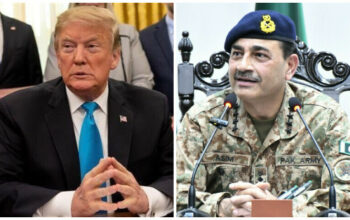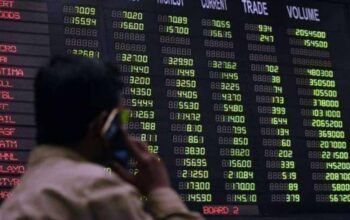Pakistan’s Paris Club lenders are beholden to the Fund – as are the DFIs like World Bank, ADB, and IDB. So why is the Fund dillydallying over its bailout for Pakistan, virtually holding up all sources of financing?
By Muhammad Ali
ISLAMABAD: Pakistani authorities and the International Monetary Fund (IMF) staff remain locked in a parley that seems in suspended animation. Due to reach staff-level agreement (SLA) over the 9th review of the USD 7 billion Extended Fund Facility (EFF) program, the parties continue to dillydally – neither able or willing to name a date.
On the face of it, the Fund staff are holding Pakistan’s feet to the fire over some outstanding items on their list of “prior actions” – performance criteria to be met before the SLA can be signed.
These include securing firm assurances of adequate financing from bilateral sources (read: KSA, UAE, and Qatar) to balance the country’s budget for the current fiscal; and instituting painful power sector reform to resolve the nagging power sector circular debt issue once and for all.
Former economic advisor of the Finance Ministry Dr Khaqan Najeeb says sustained electricity tariffs for the next fiscal year and a possible revision in the dollar reserves target for the quarter ending March could be among pending issues.
But there have been reports to the effect that Pakistani officials believe the Fund is moving goalposts with a view to putting pressure on Pakistan, although there has been no word as to what the global lender has to achieve through this kind of pressure.
But a known Pakistani public intellectual conjured a damning allegation over microblogging site Twitter Friday. He said the Fund is trying to arm-twist Pakistan into playing an active role in the Ukraine war.
Syed Hammad Ghaznavi said in his Urdu-language tweet: “Powerful sources insist we have been given a clear message: If you want financing from IMF and friendly countries, play an active role in the Ukraine war.
“The West sees only one use for Pakistan.”
This revelation comes in the wake of a US State Department spokesperson urging Pakistan to work with the Fund to right its economy. Fielding a journalist’s question, Ned Price, said: “Ultimately it’s going to have to be decisions on the part of our Pakistani counterparts to unlock this IMF funding.”
Pakistan under Prime Minister Shehbaz Sharif has steered scrupulously clear of the Ukraine war, refusing to be drawn into the conflict that has already shaken the country’s economy.
Skyrocketing LNG, petroleum, and commodity prices in the wake breakout of hostilities between Russia and Ukraine have in particular taken an unbearable toll on the external sector of Pakistan’s economy.
But Pakistanis are miffed the Fund is insisting on too right a ship, especially in the wake of the biblical disaster wrought by last monsoon’s cataclysmic flooding that rendered a third of the country’s population homeless.
The Fund staff have foisted a series of inflationary policies on the government, exacerbating an already hairy cost of living crisis.
The government had already approved hike in electricity tariff up to PKR 11 per unit including power surcharge to the tune of PKR 3.82 per unit for the current fiscal year.
It also granted its assent for continuation of power surcharge on average PKR 2.63 per unit in whole next fiscal year 2923-24.
Despite implementing all major prior tough actions under the prescriptions suggested by the world’s lender of last resort, the SLA between Pakistan and the IMF has so for remained elusive.
One of the most cited reason for this slow progress has been the trust deficit created by the multiple breaches of trust by the previous government. But senior Pakistan officials the Fund is moving goalposts.
Officials argue that IMF recently agreed to bail out Siri Lanka after that country defaulted on its external obligations. After assurances of bilateral financing from China, India and the Paris Club countries, the IMF appointed March 20, 2023 for its executive board meeting to rubberstamp the bailout.
But in Pakistan’s case, the IMF has been dilly delaying over signing the SLA, although Pakistan has already implemented tough reform measures through a minibudget in order to fetch PKR 170 billion revenues in the remaining four months of current fiscal year.
Other painful reform measures instituted by Pakistan include placing market-based exchange rate, massively hiking POL prices, increasing both power and gas tariffs, jacking up policy rate by 300 basis points from 17 to 20 percent only last week.
The GST rate was hiked by one percent from 17 to 18 percent. On 36 luxury imported items and locally manufactured luxury vehicles the GST rates was hiked up to 25 percent.
With all these tough prior actions of the IMF, the CPI based inflation has already crossed 31.5 percent and is all set to shoot to 35 percent to 40 percent in the coming months.
In February, as the Fund’s field mission was in Pakistan to kickstart the 9th review, the New York-based Human Rights Watch (HRW) made an impassioned case for why Pakistan needs more flexibility and time to bounce back economically.
The international nongovernmental group urged the Fund to allow adequate protections for Pakistan’s poor and disadvantaged, already grunting under the burden of highest inflation the country has seen in 50 years.
In a statement issuing from its New York headquarters the other day, the international NGO called on the IMF to provide Pakistan the time and flexibility to achieve a sustainable, inclusive, and rights-based recovery.”
While it seems to have fallen on deaf ears, the statement was seen as a slap on the wrist of the IMF, which had a hard-bargaining field mission in Islamabad at the time, pressing the government for more belt tightening measures to balance the budget.
The government is in a tight spot, hungry for hard currency inflows to bolster the country’s flagging forex reserves. The IMF pocket veto is keeping all Western sources of financing off tap. In the interim, iron brother China is Pakistan’s last remaining source of succour.
Last week, China approved USD 1.3 billion in loan rollovers to Pakistan, hoisting the country’s forex reserves above USD 4 billion.
Copyright © 2021 Independent Pakistan | All rights reserved




